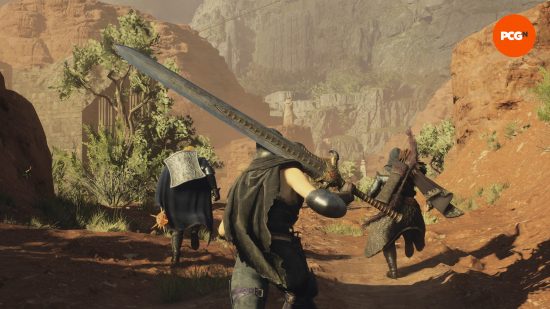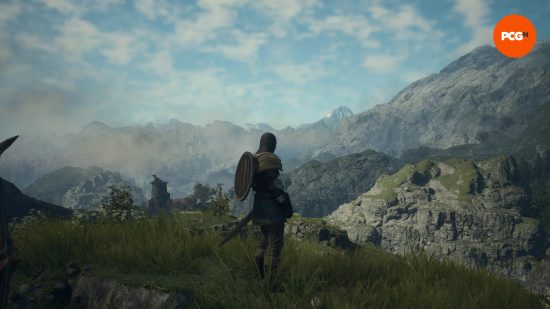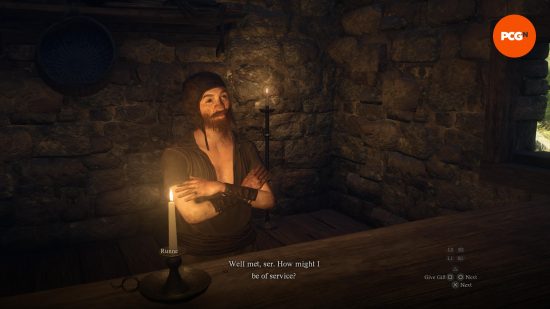In Dragon’s Dogma 2, the player is introduced as someone special. They’re not only a figure called the Arisen, marked by destiny as the rightful heir to a kingdom, but they also travel with companions called Pawns, who refer to the player as ‘master’ and obey their directions in battle and exploration.
This is typical videogame stuff; the audience is told they’re the most important aspect of the virtual world they inhabit. And yet, apart from its set-up, everything else about Dragon’s Dogma 2 takes away the feeling of privilege its Pawns and premise impart, the game working instead to make the player feel all too ordinary and fallible.
Soon after the story’s introduction, it becomes clear that exploring its fantasy world’s rolling hills, craggy shorelines, and thickly wooded forests is not going to be as frictionless as the kind of open-world games Dragon’s Dogma 2 resembles on its surface. The Arisen and their companions can only carry so much, for one thing, and the camping supplies necessary to get them back to full health after taking more serious knocks in a tough fight weigh a lot. One encounter with a group of snarling goblins might leave the party wounded and ill-prepared if, say, a towering cyclops or minotaur lumbers into view. Finishing up a quest far from a campfire or the gates of a friendly town might mean trekking a long way back through the wilderness with inventories loaded down through the darkness of night (which is very dark here), hoping to avoid enemies along the way.
Before long, the player understands that they need to plan each excursion. The quests in their journal aren’t meant to be mindlessly ticked off like a grocery list but set out upon with consideration for the potential dangers of a long journey. These quests might also disappear if left untended for too long since the game’s world never freezes in place to accommodate its audience’s whims. Sometimes, the player might get tossed off a bridge just after clearing a dungeon of monsters or die unceremoniously with goblins kicking at their prone body just after defeating a tough boss. Their save game might dump them right back into this dire situation and the only solution is to figure out how to get past what can seem like an unfair situation or a design oversight. This, compared with most open-world games, can be frustrating — and, when that frustration is overcome, it can also be immensely rewarding.
Director Hideaki Itsuno hasn’t shied away from defending this type of design. In the lead-up to Dragon Dogma 2’s launch, Itsuno discussed the game’s lack of easy fast travel or the availability of horses as well as his studio’s decision to limit players to a single save file. These choices are meant to emphasize that the game should be met by its audience on its terms, not vice versa. And, though they might seem needlessly annoying out of context, it’s the gratification that comes from understanding and playing within Dragon Dogma 2’s framework that makes it so special.
Open-world games typically sand off the rough edges of combat and exploration to keep the player suspended in a kind of pleasurable fugue state, completing activities and clearing icons off a map by fast traveling across great distances and springing back to life after dying in a perilous situation. While this gentler — or smoother — approach to design has its place, it’s hardly a catch-all method for game-making.
In Dragon’s Dogma 2’s case, the sense of grand adventure it creates is owed in large part to its willingness to frustrate. In these ways, it ends up feeling like an unlikely companion to one of this year’s biggest successes: the multiplayer shooter Helldivers 2. The latter game, for instance, features plenty of design elements that might be considered unfair or contrary to what makes for a good time. Friendly fire means that fighting off waves of murderous giant bugs with allies might result in an accidental injury or death; calling in a supply drop might result in a player getting crushed beneath a giant canister hurtling toward the ground from planetary orbit. None of this is ‘fun’ exactly, but it’s all part of what makes Helldivers 2 memorable. (The massive and enduring success of FromSoftware’s output speaks to the validity of similar approaches.)
Games don’t always need to be as obliging as they often are or as quick to make their players feel like the virtual worlds they enter should always bend to their whim. An approach to design that deemphasizes moment-to-moment enjoyment can provide something deeper than temporary ‘fun.’ It can create a feeling of presence — of inhabiting a place we can relate to — in a way that enriches the experience. Dragon’s Dogma 2 is compelling for exactly that reason. As a result, it’s far more fascinating to explore than open-world games that cling to convention in fear of even momentarily frustrating their audience.



